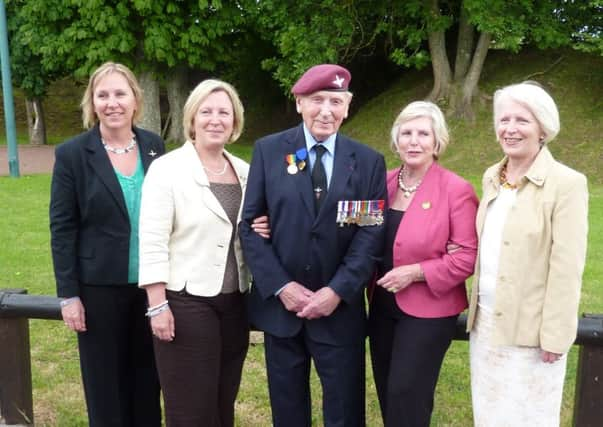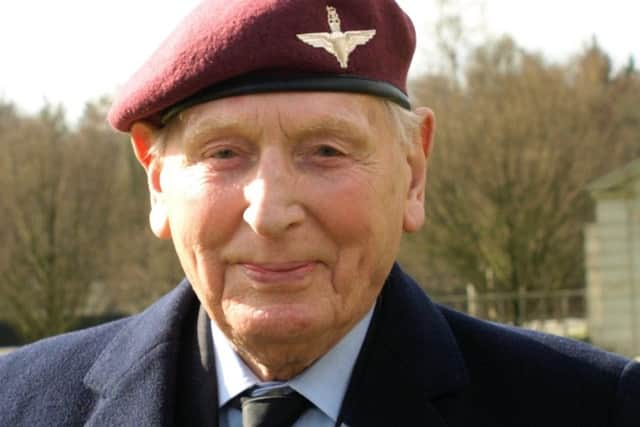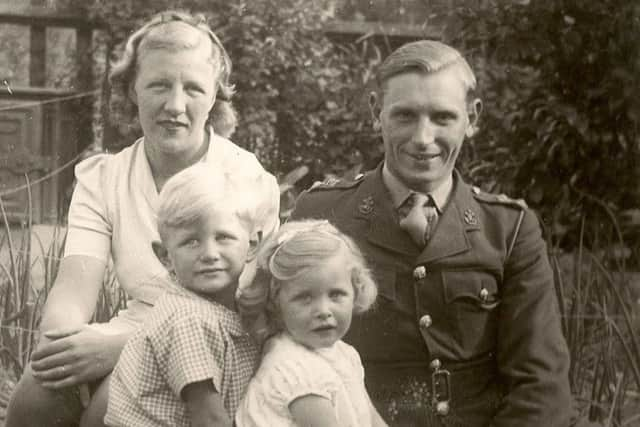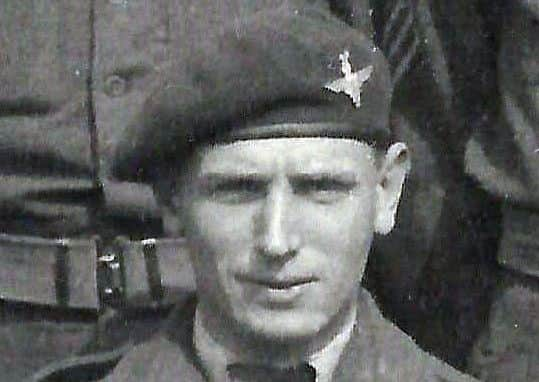Life of humble Yorkshire Second World War hero honoured by Belgian village


For Sally Warner, one of the most poignant memories she has of her father Jack Watson was seeing him standing in a war cemetery in Ranville, the French village he helped liberate on D-Day.
“I remember him standing by a grave of a young boy who was 16 called Private Johns. He had lied about his age to join up and it wasn’t until he died that they realised he was only 16.
Advertisement
Hide AdAdvertisement
Hide Ad“He was in my father’s unit and every year when we went to Normandy he would always go and put a little cross on that grave,” she says.


Yorkshireman Jack Watson was a company commander with the Paras’ 13th (Lancashire) battalion, and among the paratroopers that landed in Normandy and fought on D-Day in June 1944.
He and his men were later tasked with liberating the Belgian village of Bure, taken by the Germans during their devastating winter offensive which became known as the Battle of the Bulge.
Having to contend with heavy snow and withering machine-gun and mortar fire, the Paras suffered heavy casualties even before they launched their attack on January 3, 1945.
Advertisement
Hide AdAdvertisement
Hide AdMajor Watson rallied his troops and pressed on with the assault. The hand-to-hand and house-to-house combat through the village was ferocious. At one point he was just 50 yards from a tank and deliberately drew its fire so that his gunners could get a better shot at it.


It took three days to clear the village and the fighting was one of the turning points in the battle. However it came at a price, with the Paras losing 61 men.
Major Watson was awarded the Military Cross for his gallantry and the citation praised his courage and leadership skills, stating: “His conduct, energy, and gallantry throughout were beyond praise and without him the attack might well have failed.”
Seventy-three years on, residents of Bure are holding a ceremony later this month to commemorate his bravery and that of his men by renaming a new square ‘Place Major Jack Watson MC’.
Advertisement
Hide AdAdvertisement
Hide AdIn the decades after the war ended Major Watson organised numerous veterans’ trips to the village to pay homage to his fallen comrades, which he continued to do right up until his death in 2011 at the grand old age of 94.


Sally Warner, the youngest of his five children, is among the relatives (he has 11 grandchildren and 20 great-grandchildren) who will be attending the event on March 24 after they were invited by the burgemeester of Bure and Tellin.
“We’re thrilled and I’m sure dad would have been humbled by this. He used to go to Bure every other year in March with a group of veterans and families. I went with him on several of these trips usually with my elder sister Clare and my mum, so this means a lot to our family.”
In Bure there’s a monument to the soldiers that died fighting to liberate the village and also a plaque commemorating the battle itself.
Advertisement
Hide AdAdvertisement
Hide AdSally, who was born in Wakefield, says that like many of those from his generation her father didn’t discuss his wartime experiences for many years. “It wasn’t until I was about 18 that he started talking about it. My nephew happened to ask him one night and he began to open up.”


His story, like that of so many war heroes, is a humble one. John Bernard Robert ‘Jack’ Watson was born in Scarborough in 1917. After war broke out he enlisted, serving with the Duke of Cornwall’s Light Infantry before being assigned to the 13th Lancashire Battalion (6th Airborne Division).
He saw action on D-Day when he and his comrades helped liberate a French village. “He parachuted into a little place called Ranville which was just outside Bénouville, where Pegasus Bridge is. He landed in an orchard and they liberated Ranville which was the first French village to be liberated,” says Sally.
Here, too, Major Watson’s exploits were honoured – a bust of him was unveiled by Prince Charles in 2014. With it is a plaque inscribed with the words of General Sir Geoffrey Howlett who said of him: “He epitomised what every Parachute Regiment soldier aspires to be.”
Advertisement
Hide AdAdvertisement
Hide AdAs well as Ranville, he saw action across northern France at Putot en Auge, Pont l’Eveque and Pont Audemer. He returned to England in September that year before heading back to the battlefield following Hitler’s desperate, and ultimately doomed, attempt to stem the Allies’ advance.
“I remember him saying it was freezing cold and there was something like three feet of snow which was a prelude to the fighting in the Ardennes,” says Sally.
The fighting in Bure took a heavy toll but there was little time to rest. In March, Major Watson was involved in Operation Varsity, an airborne invasion into the industrial heartland of Germany, which involved 16,000 paratroopers and was the largest airborne drop on a single day in history.


Again in command of a company he and his men parachuted over the Rhine and pushed eastwards towards the Baltic establishing contact with the Russians at the start of May.
Advertisement
Hide AdAdvertisement
Hide AdWhen the war in Europe ended attention turned to the Middle East and Southeast Asia. After a well-earned rest Major Watson was sent to Palestine and the Suez Canal to carry out work for the British government and the international community.
He later returned to Europe serving as a military attache in Austria before retiring from the British Army in 1958.
The following year he and his wife, Laura, and their young family, left their home in Twickenham and moved to Wakefield where they spent 11 years before his job took him south again. “He loved Yorkshire and he often talked about moving back there,” says Sally.
He worked for food manufacturer J Lyons initially as a salesman and then as a sales manager before retiring in 1982, after which he became more involved with veterans associations helping organise memorial trips to the continent.
Advertisement
Hide AdAdvertisement
Hide AdDespite his bravery, Mr Watson didn’t see himself as a hero. “He used to play it down quite a lot he didn’t want to be hailed a hero,” his daughter says. “He was much more interested in taking veterans back and honouring the people that he lost.
“I have a vivid memory of seeing him in Bure standing at the stone outside the church which commemorates the 61 Paras lost in the battle, and laying a wreath while holding back the tears. You could see how emotional it was for him.”
Those who served with Mr Watson talked of their respect for him and he made a mark on French and Belgian villagers, too. “He cared about Anglo-French relations and whenever we went on these commemorative trips he was always very keen on meeting the people that lived there,” says Sally.
“During the war a lot of the civilians would give the Allied soldiers their food first. They would take them in and feed them even though they had next to nothing, and my dad felt it was just as important to remember the Belgian, French and Dutch civilians who looked after them because they had sacrificed a lot as well.”
Advertisement
Hide AdAdvertisement
Hide AdSally and her family are looking forward to attending the ceremony in Bure and feel it’s important that what happened during the war isn’t forgotten.
“I’ve got two young grandchildren and I want to make sure they know what went on, so when they’re old enough I’ll take them over and show them all these places.
“My dad didn’t want this forgotten, he wanted people to remember so that it didn’t happen again.”
Tribute by little Belgian village
The German counter-offensive in the Ardennes, now known as the Battle of the Bulge, was aimed at splitting the Allies armies in half.
Advertisement
Hide AdAdvertisement
Hide AdMore than a million men fought in the battle including 600,000 Germans, 500,000 Americans, and 55,000 British.
The ceremony in the village of Bure in Belgium later this month will be attended by two paratrooper veterans along with Major Watson’s four daughters and grandchildren.
They want to continue the tradition started decades ago by veterans, who return to Bure every two years so that this little-known British contribution to the Battle of the Bulge will never be forgotten.
The visit, on March 24, will be hosted by battlefield specialist Tours International.